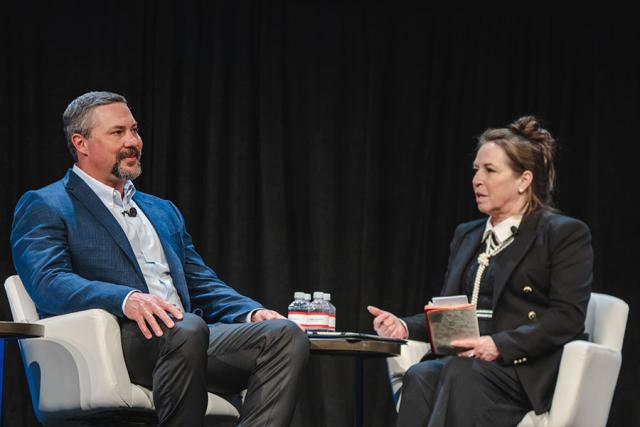
Double Eagle IV’s Cody Campbell and Hart Energy’s Nissa Darbonne onstage at the SUPER DUG conference and exhibition in Fort Worth, Texas. (Source: Hart Energy)
FORT WORTH, Texas – Double Eagle IV has expanded its Permian Basin leasehold to about 40,000 acres and is considering the addition of another rig this summer, the company’s co-CEO and co-Founder Cody Campbell said May 23 at Hart Energy’s Super DUG conference.
About 80% to 90% of the company’s acreage is in the Midland Basin, Campbell told Nissa Darbonne, Hart Energy’s executive editor-at-large, during a one-on-one session at the event.
“As of right now, we're running four rigs out there and are picking up a fifth rig in July,” Campbell said. “I think that as it's turned out we've been able to get pretty good critical mass in the Midland Basin and that's where we've operated the most, and the most comfortable. So I think that'll probably be our focus. But I certainly wouldn't rule out doing some things in the Delaware as well.”
The Double Eagle IV partnership aims to focus on investing in oil and gas properties in the Permian Basin while Tumbleweed IV, also founded by Campbell with business partner John Sellers, will focus on royalty and mineral investment across the basin.
RELATED: Double Eagle Energy Unveils 25,000-Acre Permian Basin Footprint
Campbell said Double Eagle IV looks to focus on being in the core part of the basin and isn’t afraid to pay up for higher quality properties.
“We think that in the long run, that's how you do the best, [get] the lowest break-evens, great ideas and best results,” Campbell said. “That's what we're focused on… the areas that are most productive in both basins.”
Asked what was special about the Permian, Campbell said the geology is “just so incredible.”
“It's sort of the gift that keeps on giving,” Campbell said. “We're starting to see some really positive results out of some of the deeper formations.”
Campbell also expects to see EOR-type opportunities in the basin in the future while takeaway infrastructure has added to the basin’s success.
On the topic of what drives the deals in the Permian, Campbell said M&A is related to multiple metrics but ultimately he said any deal needed to be accretive to buyers and sellers.
“If you're going to sell a deal… the net present value has to be there, which means that you have to have enough inventory to keep cash flow up and make a return on investment. So it needs to be EBITDA accretive for them… needs to be leverage accretive, it needs to be net cash flow accretive within a certain period of time,” Campbell said. “Now the bar is very high in terms of what a company can buy, what the market is going to accept a public company buying.”
Campbell said a key component to building a company is creating an E&P you’d be happy owning forever.
“We have been very focused on making sure that all our infrastructure is in place and everything is there to actually put the drill bit in the ground and actually produce oil,” he said. “And with this current iteration of Double Eagle we’re fully prepared to own the thing for a very long time and ultimately make returns the old-fashioned way, just selling oil and gas.”
Recommended Reading
Oxy’s 1PointFive Lands Federal Funds for South Texas DAC Hub
2024-09-12 - DAC technologies can pull CO2 directly from the atmosphere anywhere, avoiding the need to be near the point of emissions.
8 Rivers Lands Investment from JX Nippon for DAC Technology
2024-09-17 - An investment by JX Nippon Oil Exploration will support 8 Rivers’ Calcite direct air capture technology as it moves from pilot to commercial development, the company says.
Oxy’s 1PointFive Lands US Funding for Carbon Sequestration Hubs
2024-10-03 - 1PointFive plans to use the funding to advance site characterization activities, permitting and environmental approvals for construction at each hub, Occidental said.
Pacific Northwest Hydrogen Hub Targets Hard-to-Abate Sectors
2024-08-22 - Hydrogen demand is coming from the end users in harder-to-decarbonize sectors, hub association director says.
ADNOC to Acquire Stake in Exxon’s Hydrogen, Ammonia Facility
2024-09-04 - Exxon’s Baytown facility is expected to produce up to 1 Bcf of hydrogen daily and more than 1 million tons of low-carbon ammonia per year, if it receives required regulatory permits and government policy support.
Comments
Add new comment
This conversation is moderated according to Hart Energy community rules. Please read the rules before joining the discussion. If you’re experiencing any technical problems, please contact our customer care team.






